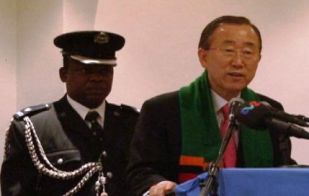Gay Rights, the Devil and the End Times: Part One

Homosexuality is one of the major political issues in our contemporary world. Especially African countries are getting known for their massive public and political rejection of same-sex relationships and “gay rights”. Frequently in the media we hear, for example, about new, stricter legislation on same-sex practices, about people arrested and jailed because of homosexuality-related offences and about the murder of gay-right activists. These cases often are presented as revealing an innate homophobia in backward Africa. Because religion, in the perception of secular Western media and publics, is almost inherently homophobic, homophobia in Africa is easily explained with a reference to the vitality of religion on the continent. Little energy is expended in the understanding of African controversies concerning homosexuality and the role of religion in all this. To enhance this understanding, I will discuss a recent case.
In February 2012, United Nations Secretary General Ban Ki-moon visited Zambia. During his visit Ban made a call to recognise the human rights of homosexuals. This evoked a heated public debate. It was the opening item of the TV news of the Zambian National Broadcasting Corporation (ZNBC). ZNBC had asked several ordinary Zambians for a response, and they all stated that homosexuality cannot be accepted because Zambia is a Christian nation. One of the respondents was an elder of the Seventh Day Adventist Church, who said that Ban’s call was a sign that the end of the world is near. The subsequent public debate, mainly on the internet, reflected a similar ‘eschatological enchantment’ of the issue of “gay rights”. This enchantment consists of two aspects: first, the identification of Ban’s call as a sign of the end times, and second, the identification of Ban with the Antichrist and the Devil. The latter is actually extended to the UN and Western political leaders, governments and non-governmental organisations in general. Website commenters state, for example, that Ban is ‘devil’s agent to satanize Zambia’, that the UN imposes ‘devilish human rights’, and that the country is ‘under a vicious attack by the forces of darkness’. Many commenters call upon all Christians in the country to oppose this demonic attack and to resist the international pressure to recognise gay rights. In the last days in which we are living, it is suggested, Christians must be ready to fight a spiritual battle, and Ban’s statement is an indication that the battle has begun.
These comments reflect a millennialist worldview that is characteristic of various strands of Zambian Christianity. Though this discourse is not representative of the Zambian public debate as a whole, it is a dominant discourse within the debate. For many people in the West, the appearance of “pre-modern” notions of the Devil, the Antichrist and the end times in debates about a “modern” issue such as homosexuality will reinforce their idea of a backward Africa. For scholars of religion, however, it is not satisfying to explain, or better to explain away, this type of discourse by referring to the role of religion, in this case “fundamentalist” forms of Christianity, in pre-modern societies. First, such an explanation ignores the fact that this Zambian discourse in many ways resembles American Christian Right discourse about homosexuality. As much as American evangelicals are not pre-modern but rather engage with and respond to “modernity” in complex and ambiguous ways, this Zambian discourse can be analysed as a way of relating to “modernity”. Second, such an explanation does not take seriously this type of discourse and the worldview it reflects, the people who represent it and the concerns they have. Therefore the challenge is to identify the contextual social and political meanings of this discourse, something I will undertake in Part Two of this post.
Adriaan van Klinken holds a PhD in religious studies from Utrecht University and is a postdoctoral research fellow at SOAS, University of London. His research focuses on issues of gender, sexuality and public life in African Christianities.

